The Dance of Undeath
My dearest brother—
(If only because our parents never saw fit to give me another, better brother, which was very selfish of them, really. If they weren't interested in making more the slow way, they could have built me something. But as you are both the only brother I have and the only person remotely clever enough to understand my genius, I suppose you will, regretfully, have to do.)
Things have been getting dreadfully dull here in Thraben. I begin to wish you were here, not to make war against me as we did when we were children—those days are properly behind us, and better left buried, which is not a thing I would say of very much—but to build new wonders for my darlings to set themselves against. I have very nearly exhausted the living resources of this once-virile land, and for the life of me, I can't tell you where all the humans have gone! Certainly, a great many of them have died, but as those are still with me, in a slightly more pleasant form, it seems their fellows should have stayed as well, if only for their ridiculous histrionics and waving about of torches.
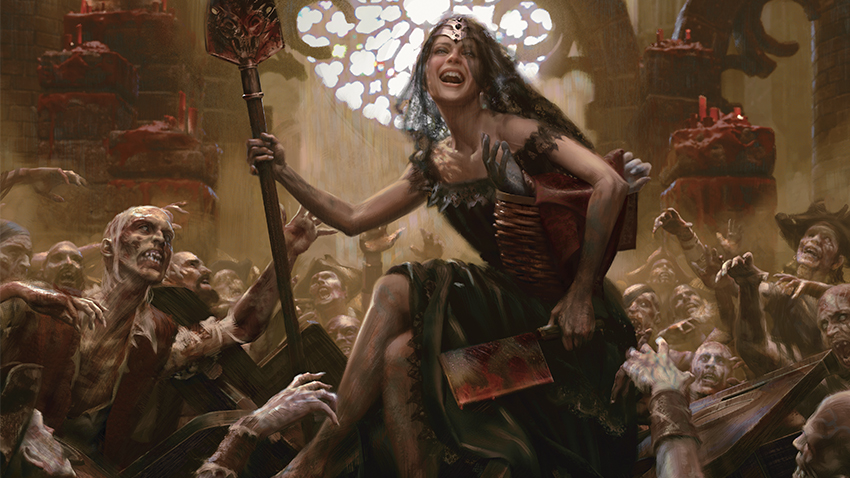
Really, brother, I had forgotten how much of the fun in this great game is in the unpredictability of the pieces. An army of the dead is a thing of beauty and a joy forever, but there's not much unpredictability in a battalion that follows all orders impeccably and without hesitation. I dream of something worthy of setting myself against!
For all that you are, a slack-jowled abomination in the eyes of the watching moon, dear brother, I dream of you. Of any opponent worthy of the honor of my consideration. Even of your putrid, pointless constructs of sinew and skin, formed from the flesh of good, honest zombies.
I have called so many rats back from the grave. They dance on the rooftops of Thraben like the most gifted of ballet corps, and they never stop, not even when they leave their toes and tails behind, rotting away in ceaseless splendor. But what's the point when no one appreciates my efforts? I have achieved our greatest dream, absolute conquest, and found it to be more hollow than we could have ever imagined.
Your loving sister,
Gisa.
Gisa—
If you're unhappy in Thraben, you have no one to blame but yourself, and your horrible personality, which has made isolation your inevitability since we were children, as no one can tolerate your company for long while they still draw breath. I've always known that you would only be truly happy among the dead. Well, you have your wish.
If you find no joy in it, that is on your own head. Do not contact me again.
Geralf.
The plate shattered against the wall, sending shards of priceless antique porcelain scattering in all directions. Gisa shrieked, a banshee's wail drawn from the throat of a living woman, and picked up the matching teacup.
From the pile of shards already heaped against the base of the wall, it was obvious to anyone who looked that she'd been at this for a while. Not that there was anyone left to look; the wreckage of her tantrum would be some archeologist's artifact of the siege of Thraben, someday, when the living took back this city-turned-crypt from its unwanted new regent.
"That filthy, talentless, worthless waste of a perfectly good skeleton!" Gisa shouted, hurling the teacup after its fellows. The sound it made when it shattered seemed to calm her somewhat, because she paused as she picked up the next plate, weighing it more carefully in her hand, like she was considering the angle of her throw. A casual observer who didn't know any better might have taken this pause as an opportunity to jump in and suggest she do something more soothing with her time or stop smashing teacups and drink a relaxing cup of herbal tea instead.
Sadly, everyone who left in what had been the main cathedral of Thraben, save for Gisa herself, was beyond such suggestions, being quite unmistakably dead. The ghoulcaller had done the sensible thing after Liliana's zombies took the city and Liliana herself moved on; she had secured it. That meant eliminating as much of the remaining living population as she possibly could, since the living were notoriously self-interested, and tended to object to being chewed on.
Having no interest in being overthrown, imprisoned, or worse, watching her beloved dead put back into the ground before she was done with them, Gisa had taken care of the threat.
But the threat was also the source of raw materials with which to expand her army, and not being—ugh—a stitcher like her blighted brother, may he be consumed by boils and burdens of the living flesh until he surrendered himself to the merciful embrace of death itself, she couldn't put her creatures back together once they reached a certain level of damage. Their flesh rotted much more slowly than it would have done in the ground, without her borrowed vitality to sustain it, but it still rotted. Limbs dropped away. Jaws loosened; teeth left their sockets. She could hold the city for now, while her legion was strong and her rule unquestioned; she couldn't hold it forever.
Empress of the empty grave and unchallenged queen of Thraben, Gisa collapsed into the plush chair that served as her throne, dropped her chin onto her knuckles, and sulked.
Outside the walls of Thraben, on the long, empty road between it and the last human-held city in Gisa's tenuous domain—now a smoldering husk occupied by the slowly gathering geists of the doomed and the dead, left to burn when they refused to rise—an army marched.
It marched without hunger or exhaustion, without pause for rest. When a marcher fell, they were left in the mud, ground to paste beneath the feet of their fellows. Not a single one objected or complained. Those weaknesses were behind them now.
At the head of their column rode a man with sunken cheeks and a still-glorious mane of hair despite the rot and blood that caked it close to his skull. His steed was a once-mighty warhorse whose hide had been mostly peeled away by decay, leaving it a walking sculpture of muscle and bone. Every step flexed its flanks and caused flecks to drop away, wearing it down stride by stride.
It carried its rider onward, single-minded in death as nothing living could ever be, and that rider scanned the horizon, axe in hand, watching for signs of movement near the walls of Thraben.
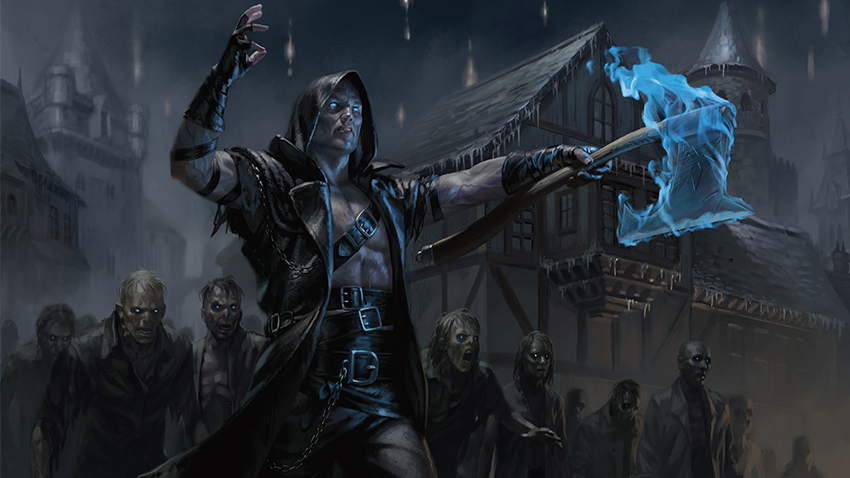
He could feel her even now, calling, calling, endlessly calling. He was not one of her mindless thralls, for all that he could name her as the architect of his second, better existence; he would have died a satiated man, happy with the story of his life, with the women he had wooed and the works he had done, had she not spurned him so unfairly. He and Gisa were meant to be together. What truer proof could there be than the fact that when he died, he rose to the mere memory of her call, still the man he was in life, still hale and handsome and ready to woo, ready to be wooed in return? He would seek her. He would find her. And he would take his rightful place at her side, Wilhelt the Breathtaking and Gisa the Glorious, figures worthy of the legend that would surely grow up around them, burying its roots in the fertile soil of their love.
Before his own death and return, he would have said ghouls had no souls remaining, that whatever animated them was beyond human feeling. And true, they had always seemed unfeeling when he walked among the living, when they were monsters to stalk the night and terrorize the innocent; but now he knew the truth. Now that he walked on the other side of the grave, he had finally seen the beautiful complexity that slumbered within the unbeating hearts of the dead. Every day when his army took shelter from the worst of the sun—the smell of sunbaked decay was never going to win any prizes—he would close his eyes and dream his dead man's dreams of Gisa.
Gisa, his purpose. Gisa, his love. Gisa, who would be his queen as soon as she accepted that his love was true and his suit sincere.
At the head of his column of the dead, Wilhelt marched on Thraben, and silence followed behind, unbroken by the screams of men or the caws of carrion birds. Where his army marched, none were left to live.
Dear Meat Mangler,
I knew you were my inferior. I never guessed you could be so cruel. I played your stupid games. I followed your endless, pointless, insufferable rules. I was the best of sisters, the very best of all possible sisters—far finer than you deserved—and now you would abandon me to boredom and the dust? You cannot even send something horrible and pointless, cobbled together from a dozen beastly birds, to give me something to do with my time? I mourn and molder here, dear brother, and at times, I even wish the people of Thraben—the ones who survived, weaklings and cowards that they were, to run so before that arrogant girlfriend of yours, Liliana—would take up torches and swords and march against me, as they might have done in days of old.
But alas, I know where the people of Thraben are located, and they are all here with me already, all sworn into my service. I could command them to lay siege to my battlements and threaten their fellows, but it would be little more than a shadow play, all the puppets tethered to my hand. I could release a few from my control, letting them turn feral and furious, but they would be quickly dismantled by the rest of my hoard, and my subjects are good, and obedient, and most importantly, mine. To sacrifice them so frivolously would be unkind in the extreme. I cannot do that to them. No matter how powerful the temptation. It would be unfair.
See, I can even treat the dead in my dominion fairly, and you cannot do the same for your own once-beloved sister! Some brother you've turned out to be.
(No longer) Yours,
Gisa.
Gisa—
I'm gifted at my art, even as I admit you have a flair for your own. Our parents passed down good bones and good blood at the same time, and we would have to be fools indeed to have squandered both. As I know you've made use of our parent's bones, against my strident objections, I must assume you're putting their blood to good use as well in your continued domination of Thraben.
I admit that your quick thought in claiming the city and Liliana's abandoned thralls impressed me. I would have done the same, in your location and possessed of your talents. But I am not jealous. My own work consumes my every waking moment; I'm honestly not sure how I've been able to carve free the time to answer your latest mewling missive.
No, I will not come to save you from the fruits of your own machinations. No, I will not intervene with this disaster of your own making. You wanted this. In the common parlance, you dug your own grave, and now you get to rot in it.
Geralf.
Gisa stalked the balcony of the cathedral, circling the spire again and again, the wind whipping through her hair and tugging her clothes into barely noticed disarray. A few dead bats squeaked their adoration as she passed them, and she acknowledged their service with a waggle of her fingers, unable to even take pleasure in their leather-winged loyalty. Calling small rodents, even the flying kind, was a child's work; Geralf would surely scoff if he saw them and ask in that smug, superior tone of his whether she didn't think she'd moved beyond such childish pastimes.
Ugh. How she missed the sound of his droning arrogance, the way he stretched his vowels as if they could stand in judgment by themselves, the way he thought he knew more than anyone else, no matter what the topic. She could never have admitted it to his face, and would have denied it to the grave, but she missed her brother.
It was odd, being away from him this long for reasons other than one or both being locked away by small-minded fools who couldn't understand the power of the Cecani genius. Dying in service of their family name was a privilege, not a right, and people shouldn't react so poorly to the honor. Especially since it wasn't like they stayed dead for terribly long.
Gisa glared at the cloudy night sky, as if daring it to do something that would offend her more than her brother's latest missive. Then she paused.
Someone was riding along the road to Thraben.
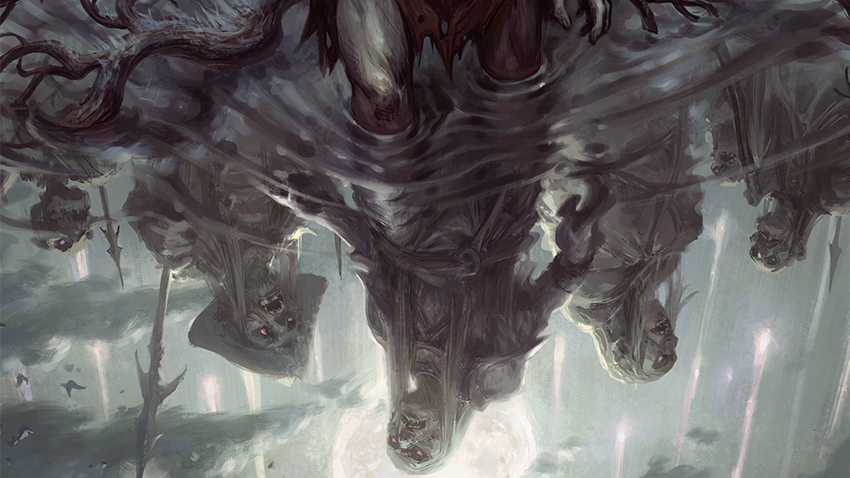
No one had come riding along that road in months. It had been quite abandoned since Liliana's dead—now Gisa's dead—had taken the city, and none living dared its boundaries! But now someone was coming, light glinting off the weapon in their hand, and what looked to be a full legion of men marched behind them. Gisa squinted at the shapes moving along the road.
No, not men. They moved as one, oddly organized, but without the smoothness of the living; their feet rose and fell in the herky-jerky rhythm of the dead. These were risen men, and that meant the figure at their head must be their ghoulcaller. Her eyes narrowed. No one was going to claim her territory. No one was even going to challenge her for it.
And it was something to do, which was delightful all beyond words. She whirled and ran for the stairs, descending into the depths of cathedral, undead bats fluttering in her wake and squeaking at a register that even most of the dead couldn't hear.
Wilhelt reached the gates of Thraben, closed and rusted, unattended by human hands for far longer than they should have been, and found Gisa already waiting there, her glorious hair unbound, her fine gown torn into the most artful and elegant of tatters. She must have done it to celebrate his arrival, for why would she have made herself so beautiful for any lesser man?
"Beautiful Gisa," he yelled, and his voice was still clear and strong, despite the darkness of the grave. Surely that alone would tell her he was no ordinary ghoul! How many of the risen could speak so clearly, could remember the name of the woman who they had loved in life? None among his company could manage such a feat! "At long last your loneliness is at an end, for I have come to join you!"
Gisa looked at him, those perfect lips curving into a slow smile, that perfect brow wrinkling in what seemed for all the world to be confusion. Finally, tilting her head to the side, she asked, "Do I know you?"
Wilhelt stared at her. "Of course you do," he replied. "I am Wilhelt the Breathtaking, and I have come to take your breath away."
"I'm still using my breath," said Gisa.
Wilhelt's stare became a scowl. "We met in the wood! It was a glorious day, made all the more so by the combined radiance of our presence."
"Oh," said Gisa, in sudden recognition. "Wilham. I do remember you. You were that pretty, pretty woodsman I met while I was searching that ancient barrow for new friends. You were less interesting than any of the dead things I'd found, and I left you to your trees. I have no real room for vanity in my life; not with Geralf so consumed by the need to swoon over his own genius." When he didn't move, she raised one hand and waved languidly, like that might be enough to hurry him along.
It didn't. He gaped at her, dead eyes disbelieving. "I came all this way
"It didn't seem to stick, and you've risen without the benefit of a ghoulcaller, from the looks of it," said Gisa, and Wilhelt was shocked to hear dismissal in her tone. "Tsk. Sloppy work, if you ask me. Any fool can plant a bush. It takes a master to shape that bush into an elephant."
Wilhelt kept staring at her as she raised her hands and whistled, a long, low note that seemed to hook itself around the base of his spine and yank, like a hook sliding into a fish. He was faced with the sudden, near-irresistible desire to lay down his axe and go to her, to surrender the fierceness of will that had called him from the grave to raise an army of his own and go to her side. To be a thrall and not a commander, subject to the whims and whimsies of her desire.
His arm trembled, muscles suddenly tired of holding his great weapon high, and he trembled as well, with the force of resisting. He had come here to join her as an equal, not as a thrall, but in the eyes of Gisa Cecani, the dead could never be equal, could never be peers, could be beloved, certainly, kept as pets were kept, but could not be her home or comfort.
He was not a possession. He was Wilhelt, dubbed the Breathtaking by every woman who had ever beheld him—every woman save for one—and that was the only woman who could possibly have been good enough for him. He had called his own army forth, despite not being considered a ghoulcaller in life, and they marched to his command. He would not yield. Gisa pulled. Wilhelt pulled back. Gisa yanked. Wilhelt nearly stumbled, his will yielding, before he recovered his mental grip and yanked in answer, breaking the tie between them as Gisa's whistle died, choked off in her throat.
She coughed, spitting out a few dissonant notes, then looked at him with narrowed eyes. "So, it's to be like this?" she asked.
He snarled. "I am no doll to be drawn into your games! Give me a chance, beautiful Gisa, and I will prove myself your peer in glorious undeath!"
Gisa's eyes narrowed. "Very well, then. I was getting bored anyway." And she retreated back through the gates of Thraben, slamming them decisively behind her, leaving Wilhelt and his army standing in front of the city, momentum broken, but mind still utterly his own.
Gisa slammed the door and whirled to press herself against it, as if her narrow body would be the final barrier to keep that man and his legion from breaching the walls of her city. Imagine, Wilham, here! In Thraben, where he had never once been invited to be, waltzing in as if he owned the place! And risen without aid, as if that weren't unutterably gauche!
People died, becoming corpses. Ghoulcallers pulled them back into the Plane, transforming them into ghouls. Or butchers like her brother used science to imbue them with a hideous, dishonest parody of life, as if electricity and chemical connections could ever replace good old-fashioned necromancy! People didn't simply die and get back up again of their own accord! Or, well, they did, she knew perfectly well that they did, but they shouldn't! It was inappropriate! It was unnecessary! It was
It was untidy. Yes, that was the word she wanted.
Untidy, but welcome all the same, because it was something to do. Geralf might think he was the only opponent she could have, but she knew better, and this
When something clanged against the outside of the door, Gisa straightened, whistled her subjects back to her, and ran. Not that she was afraid of a dead man, oh no, not in the least, but he was in all his strength on the road before her city, while she was attended only by the few who had been close enough to join her without notice. If he came in his strength, he would meet with her in all her glory, and they would see who was the superior in the dance of undeath. He would learn, as all others had learned before him, that those who underestimated Gisa Cecani did so at their peril.
They rarely did anything else after that, unless she asked them to.
The hooves of Wilhelt's stallion battered against the rusted doors of Thraben with deep, ringing echoes as Wilhelt urged the beast on, until the door crumbled between one blow and the next and the city lay open before them. Wilhelt urged his troops through the opening, choosing—wisely—to ride at the center of the formation, rather than up at the front. They needed him to direct them, and he couldn't do that if he couldn't see where he was going.
Yes. That was absolutely the reason, and not the vague fear of what an angry ghoulcaller could do when cornered in her own lair. He urged his army forward and they, having no will of their own, went. He rode well-shrouded in the decaying bodies of his fellows and didn't notice the sky above him begin to darken.
They passed under a stonework bridge, and when they rode back out the other side, the sky stayed shadow-dark above them. Wilhelt glanced up.
The swirling veil of bats and ravens, crows and vultures, opened rotting mouths, shrieked with rotting throats, and descended.
Only the most powerful ghoulcallers can whistle the beasts from their burrows, call them out of their nests, but those who can tend to have a remarkable fondness for the swarm, the nest of rats or flock of bats that has fallen into their hands. Gisa, given the population of a city to bend to her designs, was no different. Undead, rotting birds dropped from the sky to lash their talons at Wilhelt and his men. Fruitlessly, they swatted their attackers away as Wilhelt shielded his face with his arms before roaring with fury and swinging his axe in a great arc, sundered birds falling like rain. He swung again, and again, and laughed as his subjects began plucking flying things out of the air and ripping them in two.
And he rode on.
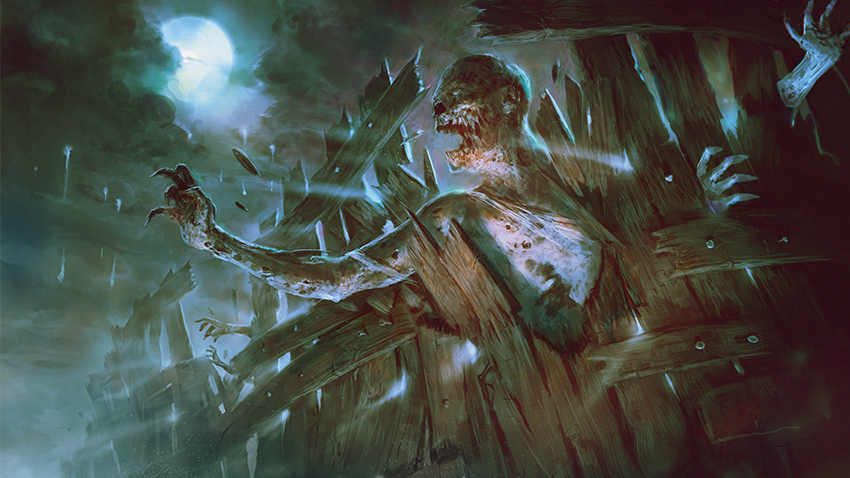
They passed out of the city entrance and onto the broad avenue that had once marked the small but bustling shopping district. The stores stood empty, doors ajar, windows dark. Wilhelt urged his men onward.
They were halfway down the avenue when the dead surged out of the buildings to either side, hands raised, ready to catch and tear and kill.
"GIIISSSSAAAAA!" roared Wilhelt, brandishing his axe as the battle raged around him. His horse reared and struck, driving sharp bony hooves through brittle skulls.
"You don't have to shout," said an irritated voice from the walkway above. Wilhelt raised his head.
"Come now, Wilham, it doesn't have to be like this," she said. "Why not surrender them to the superior ghoulcaller? It will be a better ending than the one they're meeting now
Desperately, Wilhelt glanced back to his men. They were fighting valiantly, but while he had an army, Gisa had a population. For every one his men destroyed, three more rushed in to take its place, still pouring endlessly from the broken stores. If this continued, they would lose. He turned back to Gisa.
"No," he snarled. "I will prove to you that we can be more than toys!"
"But here you are, playing with your little soldiers." Gisa sighed. "Very well. Farewell, Wilham." Then she flounced away down the walk, not looking back, as her soldiers surged forward.
She was still beautiful. Wilhelt watched her go, wistful as he'd ever been, as Gisa's dead struggled with his own line in a listless, brutal slugging match. They couldn't hope to win—he understood that now. But perhaps a triumph of arms (and legs, and severed heads) wasn't the only way to Gisa's heart.
Wilhelt reached under his breastplate and pulled out the letter he had carried next to his own unbeating heart since his resurrection. It had been written before his fingers stiffened beyond the formation of simple words and was still very legible, for a ghoul. Really, how could she help but be impressed by him?
Turning to his men, he selected one of the least decayed, who looked reasonably spry, and thrust the letter in his direction. "Go," he commanded. "You are my gift to her. Run until she bids you otherwise, only see that you give her the letter before you give over your will."
The man took the letter and ran, shuffling and stumbling, in the direction Gisa had gone.
Gisa positioned herself dead center of the square, flexing her hands and breathing quickly. She shouldn't have been this excited by the idea of a fight with someone other than stupid, stupid Geralf, but she was; this "Wilham" might be nothing but a ghoul, but he'd still managed to raise an army of his own and come to face her. He was too clingy—she wasn't going to invite him to share her lair any time soon—but he was intriguing. She was willing to admit that.
A single ghoul ran into the square, heading straight for her, an envelope clutched in his hand. She whistled and felt the hook of her song sink into his rotting mind, seizing him away from Wilham's clutches in an instant. She smiled as the boy walked more sedately to her side, now properly in her control, and plucked the envelope from his hand.
Inside was a single sheet of paper. She blinked, reading it twice before she crumpled it into a ball and tossed it to the ground.
"Beautiful Gisa—
I lived for you. I loved for you. I died for you. I rose for you.
Everything I have done in my existence has been to earn your regard.
Make me the happiest of men or ghouls, and be my queen.
Wilhelt."
WILHELT. As if she would get his name wrong, if he mattered half as much as he thought he did! The presumption of the man, to come to her territory, to deny her the ghouls that were so rightfully hers, and then to imply that she could be wrong about something as basic as a name!
She resolved to destroy him.
The invading army rode into the square, their handsome, rotting leader at their head. For the first time, he got down from his horse, striding forward with axe in hand.
"Gisa!"
She rolled her eyes. "Yes, Wilham, I know my own name. This is your last chance—surrender your ghouls, and yourself, to me, and I'll let you—well, not live. But you get the idea."
He glanced to the balled-up sheet of paper on the ground and his face fell. "No one has ever resisted my charms."
"Sweet Wilham. There's a first time for everything." She whistled, sharp and quick, and he felt his hold on his men seized again by that unseen force. He knew that was Gisa struggling to rip them away. Wilhelt roared and yanked back, delighted to see Gisa stumble, even if only a small bit; he was strong, see? He could make her listen!
Then Gisa screamed, and all the bats in Thraben descended.
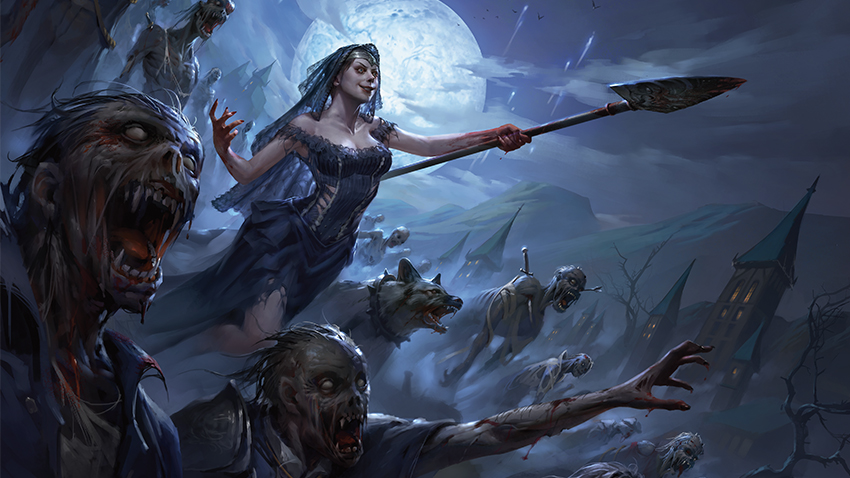
It didn't seem possible that something as small as a bat could possess so many razor-sharp teeth, or attack with such ferocity. For every one Wilhelt or his men slapped out of the air, four more surged forward, shrieking tinny shrieks and ripping at any exposed flesh. Even armor was no defense against an endless stream of biting, flying rodents whose own sense of self-preservation had been stripped away.
In the end, with the shambling remnants of his army at his side, Wilhelt was forced to turn and flee, lest his second, presumably final life end as abruptly as his first.
Gisa picked herself out of the shattered glass covering the cathedral steps, screams of the dead still ringing in her ears, loud enough to almost obscure the soothing hammer of her heart. Geralf would never let her hear the end of it if she died before he did! Bits of broken corpse were scattered around the square, human and otherwise; a pair of undead ravens pecked at the eyes of Wilham's horse, fallen and decapitated, the head—and eyes—some distance from the rest.
Wilham himself was gone. Gisa couldn't find a single piece of him.
She looked around the gore-strewn square and sighed. That was the end of this game, then. Well, there was always the next to resume.
And wouldn't Geralf be pleased to see her?
My dearest brother—
I have concluded that you are lost without me and need my loving sisterly presence to give meaning to your wasted life. I am on my way to you now and should be there inside of the sennight. Have a room ready for me. I can't wait to see what you've been doing while I was occupied with ruling the city your useless girlfriend abandoned!
Once more, your adoring sister,
Gisa.
Gisa,
What? No! I don't require your presence, which has never been loving, and can be called sisterly only on the technicality that we are unfortunately related! You will only disrupt my research. Please, please, if you must leave Thraben, go anywhere else in all of Innistrad, I beg. Anywhere but here.
Most certainly NOT yours,
Geralf.

